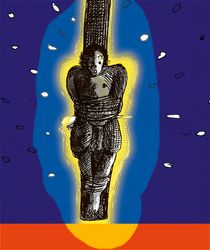Thrown out of a first-class train coach by a white man despite possessing a ticket, Mohandas Gandhi resolved to fight the notions of racial supremacy that were prevailing across the globe. The ordinary attorney’s struggle metamorphosed into history’s most remarkable civil and political struggle that would culminate in the end of the mightiest empire.
Rosa Parks refused to leave her seat for white passengers on an Alabama bus. Her prosecution for disobedience of the American state’s segregation laws kindled a landmark litigation and a non-violent movement led by Martin Luther King that led to the establishment of civil rights in the world’s mightiest nation.
Attorney Gandhi and seamstress Parks were shamed because of their skin colour that revealed their birth in a particular race. Both fought back in their own ways and prevailed against the mightiest empire and the mightiest nation, even when the racial numbers weren’t favouring them. The coloureds in South Africa and the blacks in America didn’t constitute even a tenth of those nations’ populations then, yet they triumphed.
Not so in India, inhabited by Gandhi’s own browns, where a learned and wise dalit gave us the most civilised constitution so that we would rule ourselves fairly and justly. Racism manifests in Ambedkar’s India in its most barbarian form that would make the face of an Attila cringe. Forget being thrown out of trains or buses, many dalits continue to be refused water from community wells, denied entry into shrines, made to dismount from bridal horses, made to lick boots, spat upon and peed upon, the last being the newest pastime with quite a few incidents being reported lately. A dalit was bashed up and peed on by an upper caste politico’s son in Madhya Pradesh a few weeks ago. Dalit boys were hung from trees with their hands and legs tied together in Maharashtra last week. A starving tribal youth was lynched to death in fully literate Kerala a couple of years ago.
Every time an incident is reported, politicians and keypad activists in the world’s largest democracy get outraged on X, WhatsApp and what else is up. A few may move courts and tribunals where the matter would get tied up in SC-ST atrocities act, human rights laws, criminal procedure code, evidence act, penal code and soon in nyay sanhitas. By the time the courts and tribunals decide on the matter invoking the codes and sanhitas, much water would have flowed down the Ganga, the Cauvery, the Mahanadi and the Narmada carrying the ashes of many of the culprits, victims and witnesses. Law, like our rivers, takes its own slow course.
Dalit consciousness in India is more vibrant today than ever before. There are fine writers, artists and dalit thinkers working up a vibrant intellectual culture, but dalit politics seems to have ended. The last hurrah was heard from Mayawati of the Bahujan Samaj Party, but her roar is no more terrifying politically than a tame meow these days. By simple inaction, she is losing her political mass, and her politics is gathering dynastic moss, as had happened to several Mandal parties. Last heard, she is busy seeking a successor to her subaltern throne, and is said to have zeroed in on her nephew.
The few young firebrands like Chandrasekhar Azad seem to have burnt down themselves like comets. At best, they roam around as lone rangers, unable to mobilise the masses or launch mass movements.
There may not be another Gandhi, Luther King or Ambedkar. But can we have at least another Jagjivan Ram, Kanshi Ram, or at least a Ram Vilas Paswan?
prasannan@theweek.in


